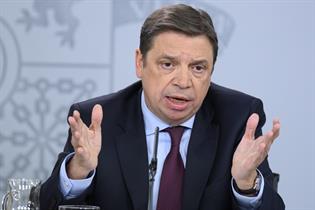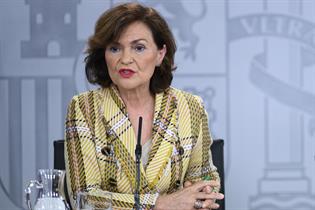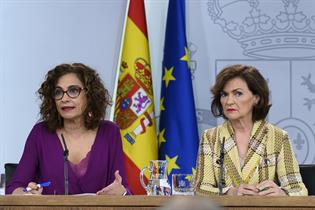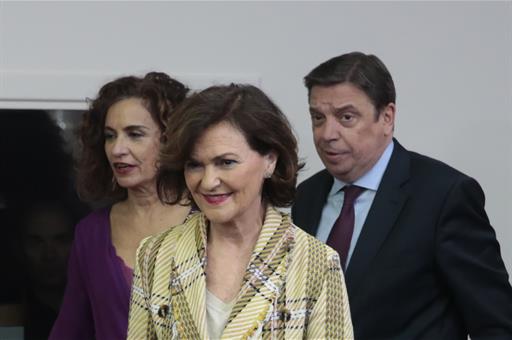Council of Ministers
Government adopts urgent measures to support agricultural sector
Council of Ministers - 2020.2.25
Moncloa Palace, Madrid
The Council of Ministers approved a Royal Decree-Law to adopt certain urgent measures on agriculture, fisheries and food.
The Minister for Agriculture, Fisheries and Food, Luis Planas, explained that this new law seeks to resolve some of the fundamental problems of the crop and livestock farming sector, such as the price volatility perceived by producers, the increasing frequency of extreme climate phenomena that cause significant damage to farms, an increase in production costs and the lack of balance in distribution of the financial margins throughout the food chain.
The new text amends the Law on measures to improve the food chain, stated the minister, such that it bans sales at losses, regulates commercial promotions "to prevent deceitful campaigns", obliges the effective production costs to be included as a factor for the establishment of prices in agricultural contracts and allows sanctions imposed on companies that break the law in sector contracts to be published.
Furthermore Law 35/2006, on Personal Income Tax is reformed to improve the current tax treatment of subsidies for the incorporation of young people in crop and livestock farming and to guarantee the generational succession.
The minister highlighted that another of the measures provided for is the reduction from 35 to 20 of the minimum number of days registered (by labourers) to gain access to unemployment benefits and agricultural income for casual agricultural day-workers resident in Andalusia and Extremadura.
In order to stabilise employment in the primary sector, the conversion of temporary agricultural employment contracts into permanent or permanent seasonal employment contracts will be encouraged. The discounts established to this end will be higher for the conversion of contracts for women, who post a higher rate of unemployment in the sector and who suffer from higher rates of temporary employment contracts, specified the minister.
Dialogue with all parties involved
 Pool Moncloa/Borja Puig de la BellacasaThe Minister for Agriculture, Fisheries and Food stated that these provisions seek to mitigate the serious difficulties affecting the crop and livestock farming sector and that has led them to organising demonstrations in recent weeks. "This is a government of dialogue and action and these measures are a direct response to some of these claims to strengthen the negotiating position of small-holders and livestock farmers and to give greater balance and transparency to the food chain".
Pool Moncloa/Borja Puig de la BellacasaThe Minister for Agriculture, Fisheries and Food stated that these provisions seek to mitigate the serious difficulties affecting the crop and livestock farming sector and that has led them to organising demonstrations in recent weeks. "This is a government of dialogue and action and these measures are a direct response to some of these claims to strengthen the negotiating position of small-holders and livestock farmers and to give greater balance and transparency to the food chain".
Luis Planas reiterated the government's commitment to the future of the sector and announced that meetings will continue with farmers and producers, cooperatives, the agri-food industry, distributors and consumers, after the 18 meetings already held since 2 February. The Agricultural Dialogue Board will meet on Tuesday afternoon to study the details of the Royal Decree-Law approved.
Inspection of rest areas for workers
The government gave its approval to visits by the Work and Social Security Inspectorate to rest areas made available to workers by companies located outside of the work centre or location where the work activity is performed. Luis Planas explained that this will help guarantee their suitability and that they meet the legal conditions on health and safety.
The government thus provides a response to the claim made recently by the United Nations Rapporteur on the situation of extreme poverty suffered by casual labourers in the countryside, although the measure is not limited to this sector of activity.
Government's legislative timetable
 Pool Moncloa/Borja Puig de la BellacasaThe First Vice-President of the Government and Minister for the Presidency, Parliamentary Relations and Democratic Memory, Carmen Calvo, presented the coalition government's legislative timetable for this year. The forecasts are based on the main pillars of the investiture speech given by the President of the Government, Pedro Sánchez.
Pool Moncloa/Borja Puig de la BellacasaThe First Vice-President of the Government and Minister for the Presidency, Parliamentary Relations and Democratic Memory, Carmen Calvo, presented the coalition government's legislative timetable for this year. The forecasts are based on the main pillars of the investiture speech given by the President of the Government, Pedro Sánchez.
The government will present 92 draft laws for their passage through Parliament in 2020, half in the first period of sessions and the other half in the second. Some of these form part of the electoral commitments made by the two parties that form the coalition.
Carmen Calvo pointed out that legislation will be put before Parliament with the status of law, constitutional law and ordinary law to foster a "great political debate" with the other parliamentary groups, although when the government considers it opportune, it will use fast-track legislation on occasions. "We want this to be a country that encourages great political debate on the challenges and goals we must cover with considerable expedience on some matters but with the calm that any medium- and long-term policies require", she said.
Among the laws that will start to be presented, the First Vice-President of the Government quoted those on education, the just transition of the economy, climate change, real equality between men and women and the fight against tax fraud.
Coordination to combat coronavirus
 Pool Moncloa/Borja Puig de la BellacasaThe government was presented with an update on the coronavirus situation, following the detection of a suspicious case on Monday in Santa Cruz de Tenerife.
Pool Moncloa/Borja Puig de la BellacasaThe government was presented with an update on the coronavirus situation, following the detection of a suspicious case on Monday in Santa Cruz de Tenerife.
The Government Spokesperson, María Jesús Montero, explained that an Italian citizen, on holiday on the island, accompanied by his wife, has been isolated in a hospital until the results of the second tests come through to confirm or rule out the disease. Tests are also being carried out on the rest of the guests staying in the same hotel.
María Jesús Montero claimed that, despite the cases detected in Italy, the World Health Organization (WHO) considers the risk of infection for the people of Europe to be moderate. The Government Spokesperson insisted that all of the technical protocols are being followed in coordination with international and European institutions, that all actions are being taken with transparency of information and that Spain and its health system are ready to detect and address possible cases.
For her part, the First Vice-President of the Government, Carmen Calvo, who chairs the Inter-ministerial Committee on the Coronavirus, which met immediately after the Council of Ministers, stated that we must be alert but act "prudently and calmly".
Passenger record
The government will send the Draft Constitutional Law on the use of the Passenger Name Register (PNR) to prevent, detect, investigate and try terrorist offences and serious crimes to Parliament under the fast-track procedure.
María Jesús Montero explained that this thus incorporates the EU Directive on the matter into Spanish law with the aim of raising security levels of European Union citizens.
The new law establishes the creation of a Passenger Information Unit, attached to the Ministry of Home Affairs, that will deal with processing PNR data in Spain.
Other agreements
- Government Delegate Committees established, which are inter-ministerial committees to examine cross-cutting issues
- Agreement reached to open Spanish Consulate-General in Chengdu (China). Its opening responds to the growing demand for tourist visas in the region.
- Approval given to present the agreement between the Kingdom of Spain and the Republic of Azerbaijan to Parliament to facilitate cooperation between the tax authorities of the two countries.
Spain's priorities for a stronger, more social and supportive Europe
 Pool Moncloa/Borja Puig de la BellacasaMaría Jesús Montero mentioned the meeting of the extraordinary European Council of Heads of State and Government of the European Union, held last week in Brussels, at which negotiations began on the EU Budget for the period 2021-2027.
Pool Moncloa/Borja Puig de la BellacasaMaría Jesús Montero mentioned the meeting of the extraordinary European Council of Heads of State and Government of the European Union, held last week in Brussels, at which negotiations began on the EU Budget for the period 2021-2027.
Spain's priorities, recalled the Government Spokesperson, are to increase resources under the Multiannual Financial Framework, to provide additional funding to the Common Agricultural Policy (CAP) and the cohesion funds and to strengthen social policies. The government is also committed to pushing through the European Unemployment Insurance Scheme, to strengthening the Youth Employment Initiative and the European Child Guarantee. It also considers it urgent for the European Union to have its own resources by creating new tax figures, such as the tax on coal at borders.
The Government Spokesperson argued that the government trusts that progress will be made in the coming weeks to break the dynamic of deadlocks. "We will work to reach a reasonable agreement that allows us to lay the foundations for a stronger, more social, more supportive Europe that is better prepared for such challenges as digitalisation and that champions the just energy transition".
Current affairs
The Government Spokesperson stated that, after the Calima episode in recent days in the Canary Islands, two seaplanes have been sent to collaborate in putting out the fires on the island of Gran Canaria, which two local helicopters, land resources and more than 200 members of the Emergency Military Unit (Spanish acronym: UME) are already working on. María Jesús Montero thanked them all for their hard work. She also explained that the traffic has returned to normal at the airport in Gran Canaria.
María Jesús Montero also reported that on Wednesday morning, the first meeting of the Dialogue Board will be held at Moncloa Palace between the Government of Spain and the Regional Government of Catalonia.
The Government Spokesperson reiterated her conviction that this political conflict, that has "raged for too long" can only be resolved through dialogue and called for responsibility, rationality and common sense to prevail to "foster a rapprochement that is widely called for by Spanish and Catalan society".
Non official translation





